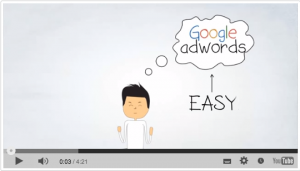 I spend a lot of time studying and obsessing over the quality score of our clients in their Adwords account as I know what a difference it can make to performance. Here and here are some previous posts on Quality Score. Over the past month or so I have become acquainted with someone who is perhaps even more of a quality score geek than I am, which is kind of reaffirming to discover.
I spend a lot of time studying and obsessing over the quality score of our clients in their Adwords account as I know what a difference it can make to performance. Here and here are some previous posts on Quality Score. Over the past month or so I have become acquainted with someone who is perhaps even more of a quality score geek than I am, which is kind of reaffirming to discover.
Chris from Ten Scores has even been kind enough to answer some questions for the Deep Footprints blog about quality score; there is some fantastic insight for all readers here so I hope that you enjoy it. I have also checked out the TenScores tool which is all about helping you to understand and improve quality score and am impressed. I suggest that when you are done with this post that you take a look too.
So; here is the meat:
1) Hi Chris, please could you give us a little background on how you got involved in PPC Marketing?
It started in 2007 when I was still living in Belgium. I had an idea for a website that I wanted to create but I needed to know if there was interest before I went full steam building it. I set up a quick email capture page and when it came to traffic, I played with adwords and facebook ads. I got fascinated about how changing one word in an ad would dramatically improve my CTRs and conversions. I was hooked. A year later, I moved to Canada to attend university. Needed some extra cash to pay for high international student fees and that’s when I discovered affiliate marketing. My world flipped over and it hasn’t been the same ever since.
2) You recently developed a product called Ten Scores that is designed to help PPC Marketers improve their quality score and consequently get a better return on their ad spend: so for anyone who is not a seasoned PPC marketer; why is quality score important?
Quality Score influences how much google charges you on every click and it influence how many of those clicks you can actually buy. So if you have high Quality Score, you’ll be rewarded with cheaper clicks and you’ll get more of them. Those are the two main reasons but there are more. I like to think of Quality Score as the heart of your Adwords account (as opposed to conversions which are the brain that make advertising work). Low Quality Scores is a sign that your heart is sick and if it goes as low as 1/10, Google stops sending you traffic, it’s like a heart attack, you die.
3) In your experience can a keyword with a low quality score (2 or 3) ever be improved to the extent that it has a QS of 9 or 10? If so what are the first steps?
Not every keyword can get to 9 or 10. But almost (I said almost) all keywords can get to 7/10, even from 2 or 3, which is the objective any advertiser should shoot for. To get 9/10 and 10/10, you have to be a really really great advertiser in a really great market. Nines and tens are achieved through exceptionally high click-through-rates. Click-though-rates that are 2x, 3x or more than any other advertiser in your market. That is easy to accomplish with brand terms, for example if someone is searching for deepfootprints and they see an ad from deepfootprints.co.uk, the probability that they will click that ad rather than another is insanely high. With that said, we have a number of customers using Tenscores that have over 100,000 non-brand keywords and are still able to average quality scores of 9 and 10/10. You have to be really really good… or really lucky to be in an easy market.
4) I have a feeling that re-searches are an important indicator of poor relevance but it seems to be a factor that people do not mention much, what would you say are the most important influences of quality score? And to what degree of importance are they?
A lot of times people want to guess what factors are important for high Quality Score and they speculate. The thing is, there is no secret and Google has provided the factors that influences it over and over again.
First you need high quality and relevant landing page. What Google means by ‘high quality’ hasn’t always been straight forward. In my experience, if what you’re selling is evident within one click, you have information about the business (about us page, contact us page) and what you do with users data (privacy policy), you’re good. Then the ‘relevant’ part for landing page means that the ads and keywords you’re using are closely connected to what you’re selling on the landing page.
Second, you got to have high relevancy between your ads and keywords. There are two components to this. Google has algorithms that compare your keywords to your ads and determine if they correlate. However, Google also uses their users to tell them which ads are relevant and which are not through the evaluation of click-through-rates.
Which brings us to the third and most important factor: click-through-rates (CTR). CTR is evaluated everywhere. At the keyword level, at the query level, at the display url level, at the geographical level (where the ad is shown), at the device level (desktop or mobile) … anywhere there’s a CTR, you can be sure Google is using it to reward or punish you high or low QS. Focusing on CTR is 90% of the work of increasing QS and when you do that, significant results start to show.
5) what would you say are the most common mistakes that businesses make with Adwords?
Wow, there are many. Let’s talk about businesses that are starting out with Adwords and then ones that have been using it for a long time.
The businesses that start out make the biggest mistake of not optimizing their sales funnel well enough before advertising. I see this happening all the time. When you focus on optimizing your sales funnel first, it forces you to measure results, track those results and sets the foundation to high ROI advertising.
For businesses that have been around Adwords for a long time, the biggest mistake is that they’re not picky enough with their keywords. Most of them have a few highly profitable keywords and a ton of low performing keywords that they let sit in an account without ever evaluating their performance. That results in a lot of wasted spend. A keyword is like an employee, if it’s not working to make a profit, it has nothing to do in your adwords account. Remove it.
6) Could we now do a bit of maths. If you have an Adwords account spending on average £5000 per month with an account level QS of 5 – how much would the account holder save if they managed to increase the average account level QS to 7 without impacting conversions?
I wish I could tell you, but I can’t. Even if I tried I’d be wrong because there’s simply too much going on when advertising that predictions like those are hard to make. However, we do give very broad estimates in Tenscores using the following formula that was provided by Google a while back:
Avg. CPC = [(AdRank Of Advertiser Below)/QS] + $0.01
You do the math 😉
[ insert your math here… hehe… ]
JC – OK; I like a challenge – The important assumption here is that all other things remain equal – i.e. just because we manage to improve our quality score through ad, keyword and landing page optimisations I will assume that the competitors quality scores remain unchanged. The reality is of course that by improving our quality scores there will be some impact on the competitors, but for now let’s ignore that.
Using an example of how ad rank varies based on QS we can get a rough figure:
Your Ad Rank (position) is determined by Maximum CPC Bid X Quality Score. If your ad rank is higher than your competitors then your ad will show above theirs.
This table shows how, for a fixed bid of £1.20, quality score affects your ad rank.
as we know, Quality Score ranges from a low score of 1 to a high score of 10.
Max Bid Quality Score Ad Rank (position) £1.20 1 1.20 £1.20 2 2.40 £1.20 3 3.60 £1.20 4 4.80 £1.20 5 6.00 £1.20 6 7.20 £1.20 7 8.40 £1.20 8 9.60 £1.20 9 10.80 £1.20 10 12.00
I will need to assume a starting average CPC, so for that I will assume £1.20 as shown in this table. With a quality score of 5 on average our ad rank averages our at 6. If we can improve QS from 5 to 7, then we can use a simple formula to estimate the average CPC needed to achieve the same ad rank.
6 (ad rank) / 7 (new quality score) = 0.86p
This means that if we improved QS from 5 to 7 AND we also bid down so that our average CPC dropped from £1.20 to 86p then we would still maintain the same average position. It’s a 28% saving
Now; I just want to say that I am not new to public humiliation; so if this is horribly wrong then please feel free to correct me in front of the Deep Footprints readers.
7) Can you give us any (non-sensitive) examples of how Ten Scores has helped businesses to increase their quality score by a factor of 20% or more?
We’re actually going to start featuring customer success stories on our blog. The most recent I have numbers for is Philip Sander from dedukta.dk. Within a few days of using Tenscores, they were able to increase their overall account QS from 3.3/10 to 5.4/10 which resulted in a 31% reduction in CPC. They still have some work to do to get it to at least 7/10 and rip all the benefits, but they’re on the right track.
8) Anything else you would like to add?
Well, thank you for this interview Joel. I like very much the interest and your recent research on Quality Score. For readers who want more information about QS, we recently created an interactive page about Quality Score. And for those who want to optimize, Tenscores.com makes it easy.
Wow – thanks Chris. Really really enlightening responses that are clear and easy for business owners to understand. We really appreciate you taking the time to contribute.

